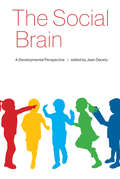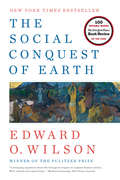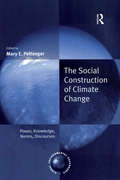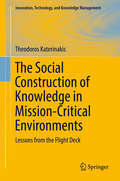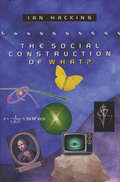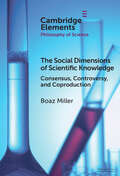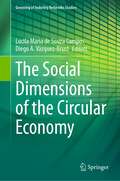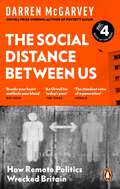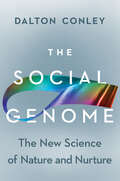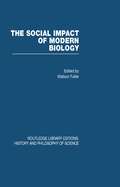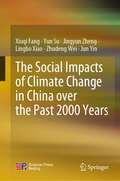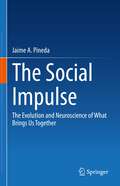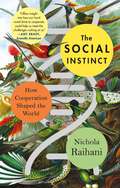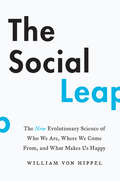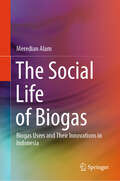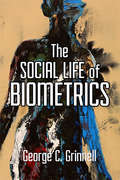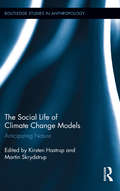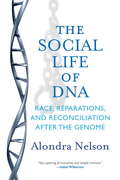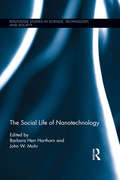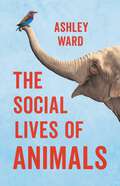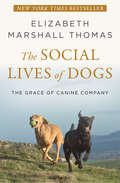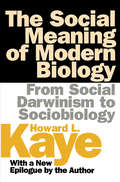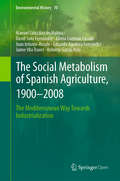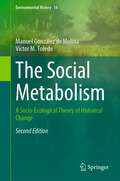- Table View
- List View
The Social Brain: A Developmental Perspective
by Jean DecetyA range of empirical and theoretical perspectives on the relationship between biology and social cognition from infancy through childhood.Recent research on the developmental origins of the social mind supports the view that social cognition is present early in infancy and childhood in surprisingly sophisticated forms. Developmental psychologists have found ingenious ways to test the social abilities of infants and young children, and neuroscientists have begun to study the neurobiological mechanisms that implement and guide early social cognition. Their work suggests that, far from being unfinished adults, babies are exquisitely designed by evolution to capture relevant social information, learn, and explore their social environments. This volume offers a range of empirical and theoretical perspectives on the relationship between biology and social cognition from infancy through childhood.
The Social Conquest of Earth
by Edward O. WilsonNew York Times Bestseller From the most celebrated heir to Darwin comes a groundbreaking book on evolution, the summa work of Edward O. Wilson's legendary career. Sparking vigorous debate in the sciences, The Social Conquest of Earth upends "the famous theory that evolution naturally encourages creatures to put family first" (Discover). Refashioning the story of human evolution, Wilson draws on his remarkable knowledge of biology and social behavior to demonstrate that group selection, not kin selection, is the premier driving force of human evolution. In a work that James D. Watson calls "a monumental exploration of the biological origins of the human condition," Wilson explains how our innate drive to belong to a group is both a "great blessing and a terrible curse" (Smithsonian). Demonstrating that the sources of morality, religion, and the creative arts are fundamentally biological in nature, the renowned Harvard University biologist presents us with the clearest explanation ever produced as to the origin of the human condition and why it resulted in our domination of the Earth's biosphere.
The Social Construction of Climate Change: Power, Knowledge, Norms, Discourses (Global Environmental Governance)
by Mary E. PettengerIndividuals, international organizations and states are calling for the world to confront climate change. Efforts such as the Kyoto Protocol have produced intractable disputes and are deemed inadequate. This volume adopts two constructivist perspectives - norm-centred and discourse - to explore the social construction of climate change from a broad, theoretical level to particular cases. The contributors contend that climate change must be understood from the context of social settings, and that we ignore at our peril how power and knowledge structures are generated. They offer a greater understanding of why current efforts to mitigate climate change have failed and provide academics and policy makers with a new understanding of this important topic.
The Social Construction of Knowledge in Mission-Critical Environments: Lessons from the Flight Deck (Innovation, Technology, and Knowledge Management)
by Theodoros KaterinakisThis volume analyzes real in-flight communications to explain the dynamics of knowledge construction. With the use of a grounded theory approach, real-life scenarios for in-depth interviews with aviation informants were developed and analyzed using discourse analysis. The study revealed aspects of tacit knowledge and expertise behavior that develop in mission-critical environments. Among the findings, the author discovered:• Silence is an interactional element and a substantial contributing factor to both completed flights and aviation incidents/accidents• Hesitation is an early reaction when situational awareness is lacking • The aviation sub-cultures contain several distinct micro-cultures which affect professional responsibility and decision making in micro-environments• Human errors should be acknowledged, discussed and repaired by all actors of the flight model • Non-verbal communication in institutional settings and mediated environments is instrumental to safe and efficient operations The results suggest fruitful applications of theory to explore how knowledge is generated in highly structured, high-risk organizational environments, such as hospitals, nuclear plants, battlefields and crisis and disaster locations. Katerinakis explains the emergent knowledge elements in communication command with messages “spoken-heard-understood-applied," from multiple stakeholders... The interplay of theory and real-flight examples, with key interlocutors, creates a valuable narrative both for the expert reader and the lay-person interested in the insights of hospitals, nuclear plants, battlefields, safety and rescue systems, and crisis and disaster locations.Ilias Panagopoulos, PhDCommand Fighter Pilot, Col (Ret)Senior Trainer, Joint Aviation Authorities (JAA) Training OrganisationSafety Manager, NATO Airlift Management ProgrammeIn this path-breaking work, Theodore Katerinakis brings the study of human communication to the airplane cockpit as a knowledge environment. Toward that end, drawing on his own experience with the Air Force and Aviation Authorities and interviews with flight controllers and scores of pilots, Katerinakis both builds on moves beyond human factors research and ecological psychology… It is a work of theoretical value across disciplines and organizational settings and of practical importance as well. His lively narrative adds to translational research by translating knowledge or evidence into action in mission-critical systems.Douglas V. Porpora, PhDProfessor of Sociology & DirectorCommunication, Culture and Media Drexel University
The Social Construction of What?
by Ian HackingLost in the raging debate over the validity of social construction is the question of what, precisely, is being constructed. Facts, gender, quarks, reality? Is it a person? An object? An idea? A theory? Each entails a different notion of social construction, Ian Hacking reminds us. His book explores an array of examples to reveal the deep issues underlying contentious accounts of reality. Especially troublesome in this dispute is the status of the natural sciences, and this is where Hacking finds some of his most telling cases, from the conflict between biological and social approaches to mental illness to vying accounts of current research in sedimentary geology. He looks at the issue of child abuse—very much a reality, though the idea of child abuse is a social product. He also cautiously examines the ways in which advanced research on new weapons influences not the content but the form of science. In conclusion, Hacking comments on the “culture wars” in anthropology, in particular a spat between leading ethnographers over Hawaii and Captain Cook. Written with generosity and gentle wit by one of our most distinguished philosophers of science, this wise book brings a much needed measure of clarity to current arguments about the nature of knowledge.
The Social Dimensions of Scientific Knowledge: Consensus, Controversy, and Coproduction (Elements in the Philosophy of Science)
by Boaz MillerThis Element is about the social dimensions of scientific knowledge. The first section asks in what ways scientific knowledge is social. The second section develops a conception of scientific knowledge that accommodates the insights of the first section, and is consonant with mainstream thinking about knowledge in analytic epistemology. The third section asks under what conditions we can tell, in the real world, that a consensus in a scientific community amounts to shared scientific knowledge, as characterized in the second section, and how to deal with scientific dissent. The fourth section reviews the ways epistemic and social elements mutually interact to coproduce scientific knowledge. This Element engages with literature from philosophy of science and social epistemology, especially social epistemology of science, as well as Science, Technology, and Society (STS), and analytic epistemology. The Element focuses on themes and debates that date from the start of the second millennium.
The Social Dimensions of the Circular Economy (Greening of Industry Networks Studies #10)
by Lucila Maria de Souza Campos Diego A. Vázquez-BrustThe main theme of this book is the social dimension of the circular economy (CE). This book’s objective is to provide a foundation for the discussion of social aspects of CE that also allows the integration of CE with the UN SDGs. The circular economy is increasingly becoming the consensual pathway for a transition towards sustainable production and consumption that balances the economic and ecological pillars of sustainable development. However, researchers have noted that the social dimension of sustainable development is noticeable missing or, at best, weakly developed in CE ideas and frameworks (Sehnem et al., 2019). The main argument of this book is that CE research and practice needs to embrace its social impacts, not only in terms of understanding and avoiding negative social impacts but also in terms of exploring the potential that CE models have for addressing social challenges.
The Social Distance Between Us: How Remote Politics Wrecked Britain
by Darren McGarvey*A RADIO 4 BOOK OF THE WEEK**SHORTLISTED FOR THE RATHBONES FOLIO PRIZE FOR NON-FICTION**LONGLISTED FOR THE RSL ONDAATJE PRIZE*'An Orwell for today's poor' - The Times'The standout, authentic voice of a generation' Herald'McGarvey is a rarity: a working-class writer who has fought to make the middle-class world hear what he has to say' Nick Cohen, GuardianWhy are the rich getting richer while the poor only get poorer? How is it possible that in a wealthy, civilised democracy cruelty and inequality are perpetuated by our own public services? And how come, if all the best people are in all the top jobs, Britain is such an unmitigated bin fire?Join Darren McGarvey on a journey through a divided Britain in search of answers. Here, our latter-day Orwell exposes the true scale of Britain's social ills and reveals why our current political class, those tasked with bringing solutions, are so distanced from our lived experience that they are the last people you'd want fighting your corner.Praise for Darren McGarvey:'Utterly compelling' Ian Rankin, New Statesman'Brilliant' Russell Brand'An absolutely fascinating individual' Owen Jones'Offer[s] an antidote to populist anger that transcends left and right... articulate and emotional' Financial Times
The Social Genome: The New Science of Nature and Nurture
by Dalton ConleyA pioneering scientist presents a mind-expanding account of the sociogenomics revolution, which promises to upend everything we know about human development. For more than 150 years, the question of nature versus nurture has been one of the most contentious issues in the human sciences. On the one side are “blank-slaters,” who believe we are mainly shaped by our environment. On the other side are “hereditarians,” who believe in the primacy of genes. From the start, the fight has been highly politicized and extremely bitter, given that it has implications for how we think about racial disparities, meritocracy, reproduction, and free will itself. In The Social Genome, pioneering scientist Dalton Conley demonstrates that this longstanding debate is fundamentally misguided. The true question is not nature versus nurture, but how nature and nurture interact to make each of us who we become. The Social Genome is a sweeping account of the sociogenomics revolution, which has, in the last decade, upended many of our notions about human development. Sociogenomics brings together advances in molecular genetics and traditional social and behavioral science. The key tool is the polygenic index, which allows us to analyze DNA to measure a child’s genetic potential. Today, we can estimate a child’s adult height, how far they will go in school, and their weight as an adult—all from a cheek swab, finger prick, or vial of saliva. Conley and other researchers are using this new science to shed light on the ways in which genes shape our world, influencing how each person both creates and responds to the environment around them. Conley reveals a world where children’s DNA influences the nurture they extract from their parents; the genes of our schoolmates affect our likelihood of smoking as much as our own DNA does; and spouses’ genes influence each other’s moods and behaviors. Looking forward, Conley envisions a future where dating, education, public health, and other institutions have been radically altered by the sociogenomic revolution. As Conley argues, we should no longer think of nature versus nurture, but about how our genes seek the nurture they need to express themselves and how, in turn, our environments are made partly from the genes of other people. The Social Genome presents a nuanced, powerful perspective on individual potential and social dynamics and raises critical ethical questions about how we will navigate a future where we have access to far more genetic information than ever before.
The Social Impact of Modern Biology (Routledge Library Editions: History & Philosophy of Science)
by Fuller WatsonOriginally published in 1971. Discoveries in modern biology can radically change human life as we know it. As our understanding of living processes, such as inheritance, grows, so do the possibilities of applying these results for good and evil, such as the treatment of disease, the control of ageing, behaviour and genetic engineering. These discoveries and their implications are discussed by some of the world’s leading biologists.
The Social Impacts of Climate Change in China over the Past 2000 Years
by Jun Yin Xiuqi Fang Yun Su Jingyun Zheng Lingbo Xiao Zhudeng WeiThis book aims to illustrate how climate change had impacted the socio-economic development in the history of China, under the framework of food security. The 10 years resolution sequences indexing the status of social and economic subsystems in China over the past 2000 years are reconstructed. Statistical methods are used to reveal the major characters and main process of the impact of historical climate change on China's social economy. This book serves as a reference both for researchers, graduates, and undergraduates majoring in geography, climatology, history, and other related fields.
The Social Impulse: The Evolution and Neuroscience of What Brings Us Together
by Jaime A. Pineda, Ph.D.This book is an exploration of the integration-differentiation dynamics that result in a drive, or impulse, toward human sociality, arguing that our need to connect with other people is as fundamental as our need for food and shelter. In The Social Impulse: The Evolution and Neuroscience of What Brings Us Together, Jaime Pineda presents the evidence that social cohesion is a complementary force to natural selection, the Darwinian drive for differentiation and diversity. The book addresses the distinctive aspects of social behavior that arise from integration principles and seeks to answer the following questions: (1) Why does social cohesion arise? (2) What is the history of social dynamics? (3) How does social cohesion work? (4) When do the developmental aspects of social dynamics arise? A final section of the book addresses the value of sociality and social cohesion. By exploring the differences, similarities, and, most important, the interactivity between natural selection and social cohesion, this unique book provides a wealth of interesting, challenging, and unexpected insights.
The Social Instinct: How Cooperation Shaped the World
by Nichola Raihani"Enriching" —Publisher's Weekly"Excellent and illuminating"—Wall Street JournalIn the tradition of Richard Dawkins's The Selfish Gene, Nichola Raihani's The Social Instinct is a profound and engaging look at the hidden relationships underpinning human evolution, and why cooperation is key to our future survival.Cooperation is the means by which life arose in the first place. It’s how we progressed through scale and complexity, from free-floating strands of genetic material, to nation states. But given what we know about the mechanisms of evolution, cooperation is also something of a puzzle. How does cooperation begin, when on a Darwinian level, all that the genes in your body care about is being passed on to the next generation? Why do meerkat colonies care for one another’s children? Why do babbler birds in the Kalahari form colonies in which only a single pair breeds? And how come some coral wrasse fish actually punish each other for harming fish from another species?A biologist by training, Raihani looks at where and how collaborative behavior emerges throughout the animal kingdom, and what problems it solves. She reveals that the species that exhibit cooperative behavior–teaching, helping, grooming, and self-sacrifice–most similar to our own tend not to be other apes; they are birds, insects, and fish, occupying far more distant branches of the evolutionary tree. By understanding the problems they face, and how they cooperate to solve them, we can glimpse how human cooperation first evolved. And we can also understand what it is about the way we cooperate that has made humans so distinctive–and so successful.
The Social Leap: The New Evolutionary Science of Who We Are, Where We Come From, and What Makes Us Happy
by William von HippelA study of how evolution has forged our modern lives—from work and relationships to leadership and innovation, as well as our quest for happiness. Human psychology is rife with contradictions: We work hard to achieve our goals, but happiness at our success is fleeting. We hope our friends will do well in life but can&’t help feeling jealous if they do too well. We&’re aghast at the thought of people we know being murdered but are unconcerned when our armed forces kill enemies we&’ve never met. We complain about difficult bosses but are often just as bad when we&’re in charge. These inconsistencies may seem irrational, but each of them has evolved to serve a vital function in our lives. Indeed, the most fundamental aspects of our psychology were permanently shaped by the &“social leap&” our ancestors made from the rainforest to the savannah. In their struggle to survive on the open grasslands, our ancestors prioritized teamwork and sociality over physical prowess, creating an entirely new kind of intelligence that would forever alter our place on this planet. A blend of anthropology, biology, history, and psychology with evolutionary science, The Social Leap traces our evolutionary history to show how events in our distant past continue to shape our lives today. From why we exaggerate to why we believe our own lies, the implications are far-reaching and extraordinary.Praise for The Social LeapWinner of the Society for Personality and Social Psychology Book Prize&“A rollicking tour through humanity&’s evolutionary past. . . . Von Hippel shows how our past explains the present and why our well-being rests on an understanding of how our minds evolved.&” —Adam Alter, New York Times–bestselling author of Irresistible&“Full of insight into human character, von Hippel&’s book provides a stimulating program for measuring success without material yardsticks.&” —Kirkus Reviews
The Social Life of Biogas: Biogas Users and Their Innovations in Indonesia
by Meredian AlamThis is the most comprehensive book discussing the impact of renewable energy transition by engaging local narratives, and combining this with the domestication of technology theory. Addressing a specific concern, the discussion considers the development of household biogas from an interdisciplinary sociological perspective and addresses the success factors for the implementation of biogas policy on the household level in Indonesia. Drawing upon extensive ethnographic fieldwork in a rural Indonesia, this book explores the interactive process of social and technological innovation from a user perspective. Their social interactions with wider stakeholders such as biogas technology trainers, laborers, construction partner organizations, and fellow users are examined. The author sheds light on emerging evidence around biogas sustainability by engaging a unique interdisciplinary framework that combines aspects of both sociology and engineering. Offering a unique insight, this book is relevant for social scientists, postgraduate students, social workers, environmental activists, communication experts, and engineers working across aspects of renewable energy development. They will gain new interdisciplinary insights and applicable approaches to building household biogas by actively engaging the users.
The Social Life of Biometrics
by George C GrinnellIn The Social Life of Biometrics, biometrics is loosely defined as a discrete technology of identification that associates physical features with a legal identity. Author George Grinnell considers the social and cultural life of biometrics by examining what it is asked to do, imagined to do, and its intended and unintended effects. As a human-focused account of technology, the book contends that biometrics needs to be understood as a mode of thought that informs how we live and understand one another; it is not simply a neutral technology of identification. Placing our biometric present in historical and cultural perspective, The Social Life of Biometrics examines a range of human experiences of biometrics. It features individual stories from locations as diverse as Turkey, Canada, Qatar, Six Nations territory in New York State, Iraq, the skies above New York City, a university campus and Nairobi to give cultural accounts of identification and look at the ongoing legacies of our biometric ambitions. It ends by considering the ethics surrounding biometrics and human identity, migration, movement, strangers, borders, and the nature of the body and its coherence. How has biometric thought structured ideas about borders, race, covered faces, migration, territory, citizenship, and international responsibility? What might happen if identity was less defined by the question of “who’s there?” and much more by the question “how do you live?”
The Social Life of Climate Change Models: Anticipating Nature (Routledge Studies in Anthropology #8)
by Kirsten Hastrup and Martin SkrydstrupDrawing on a combination of perspectives from diverse fields, this volume offers an anthropological study of climate change and the ways in which people attempt to predict its local implications, showing how the processes of knowledge making among lay people and experts are not only comparable but also deeply entangled. Through analysis of predictive practices in a diversity of regions affected by climate change – including coastal India, the Cook Islands, Tibet, and the High Arctic, and various domains of scientific expertise and policy making such as ice core drilling, flood risk modelling, and coastal adaptation – the book shows how all attempts at modelling nature’s course are deeply social, and how current research in "climate" contributes to a rethinking of nature as a multiplicity of modalities that impact social life.
The Social Life of DNA
by Alondra NelsonThe unexpected story of how genetic testing is affecting race in AmericaWe know DNA is a master key that unlocks medical and forensic secrets, but its genealogical life is both revelatory and endlessly fascinating. Tracing genealogy is now the second-most popular hobby amongst Americans, as well as the second-most visited online category. This billion-dollar industry has spawned popular television shows, websites, and Internet communities, and a booming heritage tourism circuit.The tsunami of interest in genetic ancestry tracing from the African American community has been especially overwhelming. In The Social Life of DNA, Alondra Nelson takes us on an unprecedented journey into how the double helix has wound its way into the heart of the most urgent contemporary social issues around race.For over a decade, Nelson has deeply studied this phenomenon. Artfully weaving together keenly observed interactions with root-seekers alongside illuminating historical details and revealing personal narrative, she shows that genetic genealogy is a new tool for addressing old and enduring issues. In The Social Life of DNA, she explains how these cutting-edge DNA-based techniques are being used in myriad ways, including grappling with the unfinished business of slavery: to foster reconciliation, to establish ties with African ancestral homelands, to rethink and sometimes alter citizenship, and to make legal claims for slavery reparations specifically based on ancestry.Nelson incisively shows that DNA is a portal to the past that yields insight for the present and future, shining a light on social traumas and historical injustices that still resonate today. Science can be a crucial ally to activism to spur social change and transform twenty-first-century racial politics. But Nelson warns her readers to be discerning: for the social repair we seek can't be found in even the most sophisticated science. Engrossing and highly original, The Social Life of DNA is a must-read for anyone interested in race, science, history and how our reckoning with the past may help us to chart a more just course for tomorrow.From the Hardcover edition.
The Social Life of Greylag Geese
by Isabella B. R. Scheiber Brigitte M. Weiß Josef Hemetsberger Kurt Kotrschal Isabella B. R. Scheiber Brigitte M. Weiß Josef HemetsbergerThe flock of greylag geese established by Konrad Lorenz in Austria in 1973 has become an influential model animal system and one of the few worldwide with complete life-history data spanning several decades. Based on the unique records of nearly 1000 free-living greylag geese, this is a synthesis of more than 20 years of behavioural research. It provides a comprehensive overview of a complex bird society, placing it in an evolutionary framework and drawing on a range of approaches, including behavioural (personality, aggression, pair bonding and clan formation), physiological, cognitive and genetic. With contributions from leading researchers, the chapters provide valuable insight into historic and recent research on the social behaviour of geese. All aspects of goose and bird sociality are discussed in the context of parallels with mammalian social organisation, making this a fascinating resource for anyone interested in integrative approaches to vertebrate social systems.
The Social Life of Nanotechnology (Routledge Studies in Science, Technology and Society #18)
by Barbara Herr Harthorn John W. MohrThis book addresses the interconnections and tensions between technological development, the social benefits and risks of new technology, and the changing political economy of a global world system as they apply to the emerging field of nanotechnologies. The basic premise, developed throughout the volume, is that nanotechnologies have an undertheorized and often invisible social life that begins with their constructed origins and propels them around the globe, across multiple localities, institutions and collaborations, through diverse industries, research labs, and government agencies and into the public sphere. The volume situates nano innovation and development as a modernist science and technology project in a tense and unstable relationship with a fractured, postmodern social world. The book is unique in incorporating and integrating studies of innovation systems along with a focus on the risks and consequences of a globally significant set of emerging technologies. It does this by examining the social and political conditions of their creation, production, emergence, and reception.
The Social Lives of Animals
by Ashley WardA rat will go out of its way to help a stranger in need. Lions have adopted the calves of their prey. Ants farm fungus in cooperatives. Why do we continue to believe that life in the animal kingdom is ruled by competition? In The Social Lives of Animals, biologist Ashley Ward takes us on a wild tour across the globe as he searches for a more accurate picture of how animals build societies. Ward drops in on a termite mating ritual (while his guides snack on the subjects), visits freelance baboon goatherds, and swims with a mixed family of whales and dolphins. Along the way, Ward shows that the social impulses we&’ve long thought separated humans from other animals might actually be our strongest connection to them. Insightful, engaging, and often hilarious, The Social Lives of Animals demonstrates that you can learn more about animals by studying how they work together than by how they compete.
The Social Lives of Dogs: The Grace of Canine Company (G. K. Hall Nonfiction Ser.)
by Elizabeth Marshall ThomasFrom the bestselling author of The Hidden Life of Dogs and The Tribe of Tiger comes a groundbreaking work on canine consciousness and how dogs become family Moving from Virginia to New Hampshire is a change not only for Elizabeth Marshall Thomas and her husband, but also for their three elderly dogs. A classically trained anthropologist, Thomas observes the way in which Suessi, Fatima, and Inookshook acclimate to a new house and new adventure. Over the years, as the dogs grow older and new ones are taken in, Thomas analyzes their behavior and personalities. What makes dogs react uniformly to certain situations? To what extent do they comprehend human dialogue? With every sniff of the dogs' noses and every wag of their tails, Thomas builds an impressive understanding of canine reaction and affection, and of the ways dogs support those they regard as one of their own.
The Social Meaning of Modern Biology: From Social Darwinism to Sociobiology
by Howard KayeThe Social Meaning of Modern Biology analyzes the cultural significance of recurring attempts since the time of Darwin to extract social and moral guidance from the teachings of modern biology. Such efforts are often dismissed as ideological defenses of the social status quo, of the sort wrongly associated with nineteenth-century social Darwinism. Howard Kaye argues they are more properly viewed as culturally radical attempts to redefine who we are by nature and thus rethink how we should live. Despite the scientific and philosophical weaknesses of arguments that "biology is destiny," and their dehumanizing potential, in recent years they have proven to be powerfully attractive. They will continue to be so in an age enthralled by genetic explanations of human experience and excited by the prospect of its biological control.In the ten years since the original edition of The Social Meaning of Modern Biology was published, changes in both science and society have altered the terms of debate over the nature of man and human culture. Kaye's epilogue thoroughly examines these changes. He discusses the remarkable growth of ethology and sociobiology in their study of animal and human behavior and the stunning progress achieved in neuropsychology and behavioral genetics. These developments may appear to bring us closer to long-sought explanations of our physical, mental, and behavioral "machinery." Yet, as Kaye demonstrates, attempts to use such explanations to unify the natural and social sciences are mired in self-contradictory accounts of human freedom and moral choice. The Social Meaning of Modern Biology remains a significant study in the field of sociobiology and is essential reading for sociologists, biologists, behavioral geneticists, and psychologists.
The Social Metabolism of Spanish Agriculture, 1900–2008: The Mediterranean Way Towards Industrialization (Environmental History #10)
by Manuel González de Molina Juan Infante-Amate David Soto Fernández Gloria Guzmán Casado Eduardo Aguilera Fernández Jaime Vila Traver Roberto García RuizThis open access book provides a panoramic view of the evolution of Spanish agriculture from 1900 to the present, offering a more diverse picture to the complex and multidimensional reality of agrarian production. With a clear transdisciplinary ambition, the book applies an original and innovative theoretical and methodological tool, termed Agrarian Social Metabolism, combining Social Metabolism with an agroecological perspective. This integrative analysis is especially interesting for environmental scientists and policy makers being the best way to design sustainable agroecosystems and public policies capable of moving us towards a more sustainable food system.Spanish agricultural production has experienced impressive growth during the 20th century which has allowed it to ensure the supply of food to the population and even to transform some crops into important chapters in foreign trade. However, this growth has had its negative side since it was based on the injection of large amounts of external energy, on the destruction of employment and the loss of profitability of agricultural activity. But perhaps the most serious part is the strong impact of the current industrialised agriculture model on Spanish agroecosystems, exposed to the overexploitation of hydric resources, pollution of the water by nitrates and pesticides, high erosion rates and an alarming loss of biodiversity; damage which in the immediate future will end up reducing production capacity.
The Social Metabolism: A Socio-Ecological Theory of Historical Change (Environmental History #14)
by Víctor M. Toledo Manuel González de MolinaThis book helps readers to understand the fast growing and timely concept of social metabolism. The authors shed a light on the different existing terms and methodologies that have been developed over the years. Through the study of history, readers will get an understanding of the main currents or schools that exist around this concept and their main findings. Also provides examples of how to apply the metabolic approach at different territorial and temporal scales and using different methodological tools. The book presents a novel socio-metabolic theory of historical change, in which biophysical and social variables are combined in an integrated way to understand the dynamics of socio-metabolic transitions.In this second edition, the authors provide valuable updates and new sections to each of the previous chapters. New insights on global phenomena like climate change and the environmental crisis are also considered. As readers will learn, a paradigm shift in almost all areas of research and society will be needed to face the challenges created by the modern industrial society. The authors use a look back in history, to explore the relationship between humans and nature from an evolutionary and thermodynamic perspective. With this approach, readers from history, environmental sciences and social sciences will get valuable insights on possible solutions.
